UN rights experts concerned over 'pervasive' corruption in Philippines

MANILA, Philippines — In its recent periodic review, the United Nations Human Rights Committee raised alarm over reports that graft and corruption in the Philippines worsened during the COVID-19 pandemic.
In an advanced version of the report, the committee, composed of independent experts, acknowledged some strides made in recent years, but it pointed to areas that are lacking.
Philippine officials reported the establishment of the 8888 Citizens' Complaint Hotline in 2016 as well as the creation of the Presidential Anti-Corruption Commission in 2017.
The UN body found the measures insufficient, citing reports of allegations against public officials while the country dealt with the health crisis.
"The Committee remains concerned by reports that corruption remains pervasive and has intensified in the context of the State response to the COVID-19 pandemic," it said in the 13-page report.
In 2021, a series of testimonies bared the involvement of foreign-owned and undercapitalized Pharmally Pharmaceutical Corp. in questionable health supplies contracts with the government amounting to P42 billion.
Two of the company's executives who allegedly benefited from the sizeable pandemic deals were released from detention in June.
While it did not refer to the Pharmally scandal specifically, the UN panel urged the Philippines to "ensure that all allegations of corruption, including those related to public procurement, are promptly, independently and thoroughly investigated."
The government should also see that "those responsible are duly tried and adequately punished, and that victims receive full reparation," it said.
Crippled anti-corruption bodies
In March this year, the Philippine government reported to the UN body that the Office of the Ombudsman had disposed of 617 cases in 2019 out of its 3,947-case docket, leading to convictions in more than half of the processed cases,
Officials failed, however, to detail the accomplishments of the Presidential Anti-Corruption Commission as the UN panel requested in 2020.

Citing unspecified reports, the UN committee argued that the Office of the Ombudsman lacks "financial and technical resources to investigate" allegations of corruption.
"The State party should intensify its efforts to prevent and eradicate corruption and impunity at all levels," it said. "To this end, it should immediately provide sufficient human, technical and financial resources to its anti-corruption bodies, including the Ombudsman's Office, with a view to enabling it to effectively and independently discharge its mandates."
Besides its comments on the problem of corruption in the Philippines, the UN committee also laid down other recommendations on the human rights situation.
It called for the repeal of some provisions of the Anti-Terrorism Act, the release of Sen. Leila de Lima from detention, cooperation with the International Criminal Court investigation into extrajudicial killings and the passage of measures on abortion, anti-discrimination and divorce, among other proposals. — Camille Diola
- Latest
- Trending































